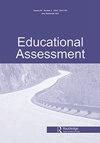The Nature of Cognitive Test Anxiety: An Investigation of the Factor Structure of the Cognitive Test Anxiety Scale
IF 2.3
Q1 EDUCATION & EDUCATIONAL RESEARCH
引用次数: 5
Abstract
ABSTRACT The Cognitive Test Anxiety Scale (CTAS) is a unidimensional scale designed to measure the cognitive aspect of test anxiety. The instrument has been adapted in several countries, and convincing psychometric properties have been found; however, uncertainties remain regarding its factor structure. Therefore, the aim of this study is twofold: to revise the instrument’s factor structure and to investigate the state or trait nature of the construct. The results of exploratory and confirmatory factor analyses suggest that the CTAS includes three dimensions: general worry, freezing up, and fear of failure. The reliability measures of the subscales showed appropriate values and validity evidence supported the multidimensionality of the CTAS. Finally, the state or trait nature of the construct was studied through an investigation of the effect taking an exam before the test’s administration has on CTAS scores. Results imply that cognitive test anxiety measured by the CTAS should be considered as a trait.认知测试焦虑的本质——认知测试焦虑量表的因子结构研究
认知测试焦虑量表(CTAS)是一种一维量表,旨在测量测试焦虑的认知方面。该仪器已在几个国家进行了调整,并发现了令人信服的心理测量特性;然而,其要素结构仍存在不确定性。因此,本研究的目的是双重的:修改工具的因素结构,并调查结构的状态或特征性质。探索性和验证性因素分析结果表明,CTAS包括三个维度:普遍担忧、冻结和对失败的恐惧。分量表的信度测量显示出适当的值,有效性证据支持CTAS的多维性。最后,通过调查在考试前参加考试对CTAS成绩的影响,研究了结构的状态或特征性质。结果表明,CTAS测量的认知测试焦虑应被视为一种特质。
本文章由计算机程序翻译,如有差异,请以英文原文为准。
求助全文
约1分钟内获得全文
求助全文
来源期刊

Educational Assessment
EDUCATION & EDUCATIONAL RESEARCH-
CiteScore
3.20
自引率
6.70%
发文量
24
期刊介绍:
Educational Assessment publishes original research and scholarship on the assessment of individuals, groups, and programs in educational settings. It includes theory, methodological approaches and empirical research in the appraisal of the learning and achievement of students and teachers, young children and adults, and novices and experts. The journal reports on current large-scale testing practices, discusses alternative approaches, presents scholarship on classroom assessment practices and includes assessment topics debated at the national level. It welcomes both conceptual and empirical pieces and encourages articles that provide a strong bridge between theory and/or empirical research and the implications for educational policy and/or practice.
 求助内容:
求助内容: 应助结果提醒方式:
应助结果提醒方式:


